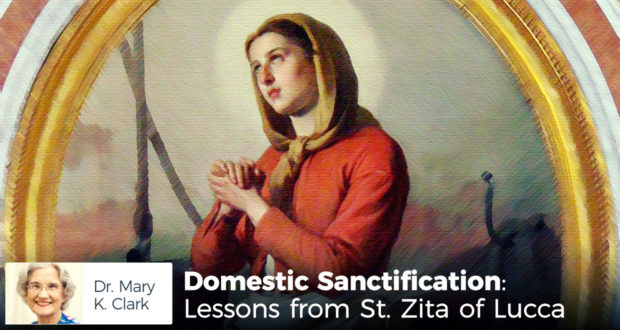Summary
St. Zita, patron of homemakers, can help us love our families, find Christ in our chores, and complete our work each day in peace and joy.On April 27, we celebrate the Feast Day of St. Zita of Lucca, the humble domestic who achieved her sainthood by zealously carrying out the minutiae of her mundane tasks.
In her own way, this Italian housekeeper lived out ahead of her time the principles of the Little Way, which were expressed by St. Therese of Lisieux many centuries later.
St. Zita was born in 1218 to poor parents in a small village near Lucca in northwestern Tuscany. At the age of twelve, Zita was sent to Lucca to become a servant for the Fatinellis, a relatively affluent family involved in the textile industry.
From her earliest days in service, Zita made a point of taking time each day for prayer, both attending daily Mass and getting up in the middle of the night for a period of solitary prayer. This habit remained with Zita until her death in 1278.
Her routine of prayer notwithstanding, Zita was not a contemplative, and she is known for having said that in the working classes, a piety that shied away from labor was only a “sham piety.” She placed great store in doing her job well and was known for her industrious nature.
Unfortunately, in her early years as a servant, she was much maligned by her fellow servants for her piety and for her diligence, both of which were a standing reproach to the other servants’ lack of dedication.
For a time, even her employers held Zita in disfavor because of the lies and backbiting of the other servants.
Nonetheless, after some time, Zita succeeded in winning over the rest of the household, and in later years, she became the trusted housekeeper in charge of all the Fatinelli family’s household affairs and goods.
She managed the servants beneath her with compassion and kindness and without ever attempting revenge for their previous ill treatment of her She kept her employers happy and in good temper, attended their children, and could always be depended upon to care for the homeless, poor, and those otherwise in need.
Upon her death in 1278, she was immediately acclaimed as a saint by the people of the surrounding countryside, and to this day, her memorial is still celebrated with a great festival in her native land.
The life of St. Zita holds many important lessons for homeschooling parents today. First is the importance of reserving some small amount of time just to focus on God.
No matter how crazy or difficult our lives can become, no matter how large the mountain of tasks, or how ceaseless the needs of our children, we must never forget to dedicate some portion of our day (be it ever so small) to our own spiritual lives.
Without daily time in the presence of God, we have no source to replenish the grace and strength needed in our work of caring for our families.
Second, we must remember that in serving our families, we are serving God. St. Zita firmly believed that in all her little household tasks, she was serving God, not just man.
She understood that “as long as you did it to one of these my least brethren, you did it to me” (Matt. 25:40). Devotion to the demands of our state in life and zealous fulfillment of its duties constitutes our obedience to the will of God.
Each task we undertake is an act of love for God, even as it fulfills some practical purpose within the life of our families.
Third, good stewardship should be our constant motto. Our time, our resources, and our talents should be managed with care so that they do not go to waste.
Like Zita, whose zeal in fulfilling her duties and care in managing both goods and people admitted her to the confidence of her employers, we should seek always to make the most of what has been given to us to have and to do, so that in eternity we may be welcomed by Christ as “good and faithful servants.”
Finally, we must be grateful for what we’ve been given and stand ready to share it with others when they have need.
Though St. Zita was not wealthy, she always found something to give to those less fortunate than herself, whether that was the meal provided by her employers, or the money that had been given her for new clothing.
If she had nothing material to share, she gave her prayers and her comfort. We all know families in worse circumstances than our own; it is our responsibility to thank God for the blessings He has afforded us, both spiritual and material, and to be generous with those same gifts to those less privileged than ourselves.
St. Zita, teach us to find Christ in our chores. Beg for us the graces we need to love our families and complete our work each day in peace and joy. Help us to cultivate gratitude and charity in ourselves and our children, so that we may one day rejoice with you at the feet of our Heavenly Father. Amen.

 Seton Magazine Catholic Homeschool Articles, Advice & Resources
Seton Magazine Catholic Homeschool Articles, Advice & Resources
